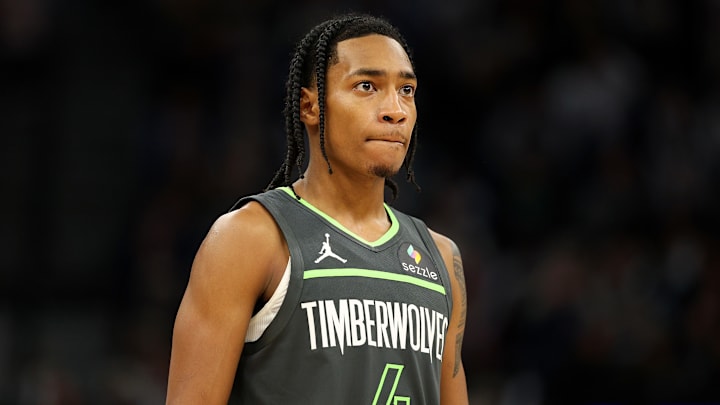Second-year Minnesota Timberwolves guard Rob Dillingham has always had clear offensive gifts as a three-level scorer with dynamic ball-handling abilities. This trend has continued in NBA Summer League play, as Dillingham has averaged 15 points and 7.5 assists. However, defense has been a key concern for the 6-foot-1 guard. Dillingham’s size will always make it challenging for him on defense.
Regardless, Dillingham’s summer league play has been a positive sign for his defense. If Dillingham’s defensive impact translates to NBA play, it could drastically change his outlook. Let's dive into Dillingham's summer league defense and what it could mean for this upcoming season.
Dillingham's summer league defense
Through two summer league games, Dillingham has averaged 2.5 steals. By hounding opposing ball handlers and playing the passing lanes, Dillingham has been making a positive defensive impact. As a smaller guard, getting steals and making effort plays will always be Dillingham’s path to being a passable defender. His defensive intensity has been a clear bright spot during the summer league.
Rob Dillingham recovery steal pic.twitter.com/cJsWwWQ77h
— Timberwolves Clips (@WolvesClips) July 10, 2025
However, Dillingham has also shown some nuance, improving his screen navigation abilities. This will perhaps be the most important aspect of Dillingham’s defense in the NBA. Dillingham will be constantly targeted due to his size, so navigating screens quickly will be crucial. In summer league play, Dillingham has shown an ability to do this, and his reaction time has been on point. Overall, from an effort and detail perspective, Dillingham’s defense has looked much better.
Dillingham's role with the Wolves
Defense was the main reason Dillingham didn’t play much as a rookie. However, with another year of growth and some added strength, Dillingham could significantly improve on defense in his second year. It’s only summer league, but this is undoubtedly a positive sign for Dillingham’s defensive growth.
Playing alongside defenders like Rudy Gobert, Jaden McDaniels, and Anthony Edwards will help cover up some of Dillingham’s defensive weaknesses. Still, improvements on Dillingham’s end will be necessary, especially given the Wolves' defensive-minded culture, and it looks like he’s gotten much better in this area.
With his offensive skill set, Nickeil Alexander-Walker leaving, and Mike Conley aging, Dillingham was already poised for a bigger role. However, Dillingham’s defensive strides solidify this and could make this role even bigger than expected. If Dillingham can become a passable defender, he will be the clear point guard of the future next to Edwards. Dillingham’s offensive fit next to Edwards has always been obvious; however, with defensive growth, the upside of this backcourt pairing is even higher.
